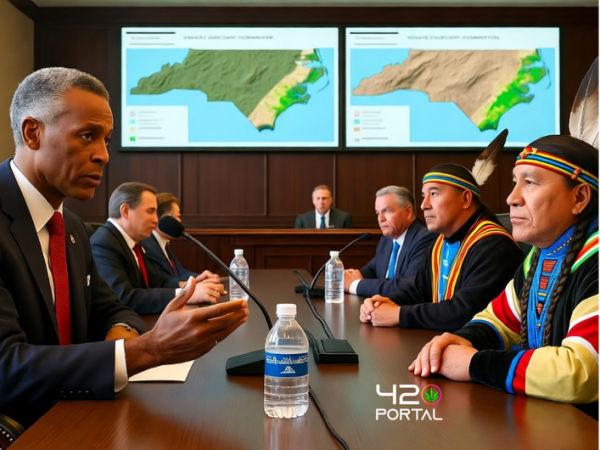Tensions Rise Over Tribal Cannabis Sales in North Carolina

10/10/2025
A recent Senate Judiciary Committee hearing spotlighted growing friction between federal lawmakers and Native American tribes over marijuana distribution. North Carolina Republican Senator Thom Tillis pressed United States Attorney General Pam Bondi to launch a federal probe into the Eastern Band of Cherokee Indians' burgeoning cannabis sector. The exchange occurred on October 7, 2025, amid discussions on law enforcement priorities.
The Eastern Band of Cherokee Indians, a sovereign nation based in western North Carolina, launched its inaugural recreational marijuana dispensary in 2024. Operating under tribal authority, the Great Smoky Cannabis Company allows adults to purchase cannabis products exclusively on reservation land. Once removed from tribal boundaries, however, such items violate state and federal prohibitions. Marijuana remains classified as illegal across North Carolina, Tennessee, Georgia, and South Carolina, creating a patchwork of regulations that complicates enforcement.
Tillis voiced particular alarm over what he described as aggressive promotional strategies by the tribe's enterprise. He pointed to seasonal offerings, including autumn-themed flavors and holiday-themed edibles, which he argued appeal directly to younger consumers in a manner reminiscent of past tobacco campaigns. Tillis also scrutinized a mobile application that facilitates online orders with curbside pickup near reservation edges, questioning its adherence to jurisdictional limits.
While Tillis affirmed support for on-reservation sales, he stressed that inconsistent handling endangers public safety and undermines broader drug policies. In response, Eastern Band Principal Chief Michell Hicks defended the operations as fully aligned with both tribal sovereignty and applicable federal guidelines. Hicks suggested the scrutiny stems from unrelated political disputes, notably efforts to grant federal recognition to the Lumbee Tribe, a process championed by Tillis alongside fellow North Carolina Senator Ted Budd.
Bondi committed her department to examining the app and commercial practices, acknowledging that interstate movement of controlled substances contravenes national statutes. This pledge underscores ongoing debates about reconciling indigenous autonomy with uniform drug enforcement.
Reference
The Eastern Band of Cherokee Indians, a sovereign nation based in western North Carolina, launched its inaugural recreational marijuana dispensary in 2024. Operating under tribal authority, the Great Smoky Cannabis Company allows adults to purchase cannabis products exclusively on reservation land. Once removed from tribal boundaries, however, such items violate state and federal prohibitions. Marijuana remains classified as illegal across North Carolina, Tennessee, Georgia, and South Carolina, creating a patchwork of regulations that complicates enforcement.
Tillis voiced particular alarm over what he described as aggressive promotional strategies by the tribe's enterprise. He pointed to seasonal offerings, including autumn-themed flavors and holiday-themed edibles, which he argued appeal directly to younger consumers in a manner reminiscent of past tobacco campaigns. Tillis also scrutinized a mobile application that facilitates online orders with curbside pickup near reservation edges, questioning its adherence to jurisdictional limits.
While Tillis affirmed support for on-reservation sales, he stressed that inconsistent handling endangers public safety and undermines broader drug policies. In response, Eastern Band Principal Chief Michell Hicks defended the operations as fully aligned with both tribal sovereignty and applicable federal guidelines. Hicks suggested the scrutiny stems from unrelated political disputes, notably efforts to grant federal recognition to the Lumbee Tribe, a process championed by Tillis alongside fellow North Carolina Senator Ted Budd.
Bondi committed her department to examining the app and commercial practices, acknowledging that interstate movement of controlled substances contravenes national statutes. This pledge underscores ongoing debates about reconciling indigenous autonomy with uniform drug enforcement.
Reference







